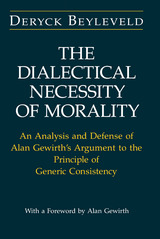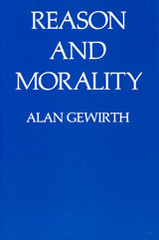4 books about Gewirth, Alan

The Community of Rights
Alan Gewirth
University of Chicago Press, 1997
Alan Gewirth extends his fundamental principle of equal and universal human rights, the Principle of Generic Consistency, into the arena of social and political philosophy, exploring its implications for both social and economic rights. He argues that the ethical requirements logically imposed on individual action hold equally for the supportive state as a community of rights, whose chief function is to maintain and promote the universal human rights to freedom and well-being. Such social afflictions as unemployment, homelessness, and poverty are basic violations of these rights, which the supportive state is required to overcome. A critical alternative to both "liberal" and "communitarian" views, this book will command the attention of anyone engaged in the debate over social and economic justice.
[more]

The Dialectical Necessity of Morality
An Analysis and Defense of Alan Gewirth's Argument to the Principle of Generic Consistency
Deryck Beyleveld
University of Chicago Press, 1991
Alan Gewirth's Reason and Morality, in which he set forth the Principle of Generic Consistency, is a major work of modern ethical theory that, though much debated and highly respected, has yet to gain full acceptance. Deryck Beyleveld contends that this resistance stems from misunderstanding of the method and logical operations of Gewirth's central argument. In this book Beyleveld seeks to remedy this deficiency. His rigorous reconstruction of Gewirth's argument gives its various parts their most compelling formulation and clarifies its essential logical structure.
Beyleveld then classifies all the criticisms that Gewirth's argument has received and measures them against his reconstruction of the argument. The overall result is an immensely rich picture of the argument, in which all of its complex issues and key moves are clearly displayed and its validity can finally be discerned.
The comprehensiveness of Beyleveld's treatment provides ready access to the entire debate surrounding the foundational argument of Reason and Morality. It will be required reading for all who are interested in Gewirth's theory and deontological ethics and will be of central importance to moral and legal theorists.
Beyleveld then classifies all the criticisms that Gewirth's argument has received and measures them against his reconstruction of the argument. The overall result is an immensely rich picture of the argument, in which all of its complex issues and key moves are clearly displayed and its validity can finally be discerned.
The comprehensiveness of Beyleveld's treatment provides ready access to the entire debate surrounding the foundational argument of Reason and Morality. It will be required reading for all who are interested in Gewirth's theory and deontological ethics and will be of central importance to moral and legal theorists.
[more]

Gewirth's Ethical Rationalism
Critical Essays with a Reply by Alan Gewirth
Edited by Edward Regis Jr.
University of Chicago Press, 1984
Alan Gewirth's Reason and Morality directed philosophical attention to the possibility of presenting a rational and rigorous demonstration of fundamental moral principles. Now, these previously unpublished essays from some of the most distinguished philosophers of our generation subject Gewirth's program to thorough evaluation and assessment. In a tour de force of philosophical analysis, Professor Gewirth provides detailed replies to all of his critics—a major, genuinely clarifying essay of intrinsic philosophical interest.
[more]

Reason and Morality
Alan Gewirth
University of Chicago Press, 1982
"Most modern philosophers attempt to solve the problem of morality from within the epistemological assumptions that define the dominant cultural perspective of our age. Alan Gewirth's Reason and Morality is a major work in this ongoing enterprise. Gewirth develops, with patience and skill, what he calls a 'modified naturalism' in which morality is derived by logic alone from the concept of action. . . . I think that the publication of Reason and Morality is a major event in the history of moral philosophy. It develops with great power a new and exciting position in ethical naturalism. No one, regardless of philosophical stance, can read this work without an enlargement of mind. It illuminates morality and agency for all."—E. M. Adams, The Review of Metaphysics
"This is a fascinating study of an apparently intractable problem. Gewirth has provided plenty of material for further discussion, and his theory deserves serious consideration. He is always aware of possible rejoinders and argues in a rigorous manner, showing a firm grasp of the current state of moral and political philosophy."—Mind
"This is a fascinating study of an apparently intractable problem. Gewirth has provided plenty of material for further discussion, and his theory deserves serious consideration. He is always aware of possible rejoinders and argues in a rigorous manner, showing a firm grasp of the current state of moral and political philosophy."—Mind
[more]
READERS
Browse our collection.
PUBLISHERS
See BiblioVault's publisher services.
STUDENT SERVICES
Files for college accessibility offices.
UChicago Accessibility Resources
home | accessibility | search | about | contact us
BiblioVault ® 2001 - 2024
The University of Chicago Press









